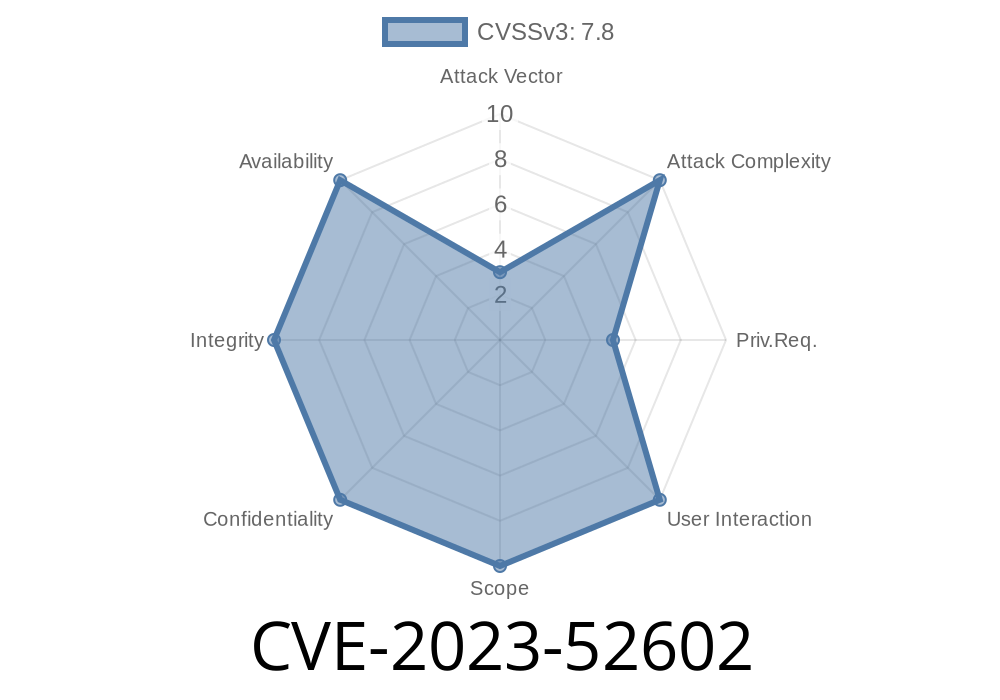Linux powers so much of the world: from web servers, personal computers, phones, all the way to supercomputers. But sometimes, even mature subsystems like the Journaling File System (JFS) get things wrong. In late 2023, researchers uncovered CVE-2023-52602, a bug that could let malicious users read out-of-bounds memory on Linux systems. In this post, we’ll unpack how the bug happened, how it could be exploited, and how the Linux community fixed it.
What Is JFS?
JFS) (Journaling File System) is a file system created by IBM for Linux, used often for its stability and performance. While not as common as ext4, it’s still in use — especially in older servers and devices.
The Heart of the Bug: Slab-Out-of-Bounds Read
Linux memory is managed in “slabs” — memory areas for objects of the same type. A “slab-out-of-bounds Read” means code is trying to read memory *outside* the boundaries set by the kernel for a given object. That can leak critical information, crash computers, or open ways for further exploits.
In this case, CVE-2023-52602 affected dtSearch, a function inside JFS that looks up entries in the directory pages.
How Did the Bug Work?
When JFS needs to look up something inside a directory, it keeps pointers to entries in a “sorted entry table.” dtSearch scans through this table to find a match. The original code didn’t properly check if the index could step outside the list’s valid entries.
Here’s the kind of problematic code that led to the bug (simplified)
// PSEUDO CODE CLOSE TO THE ORIGINAL BUG
struct data_entry *entries = ...;
int num_entries = ...;
for (int i = ; /* missing boundary check */; i++) {
if (entries[i] == wanted) {
// found it!
return i;
}
// If not found, could try to read past the array!
}
If i ended up just a bit too high — perhaps with weird or corrupted directory data — it would read *outside* the array, pulling in garbage, maybe even secret kernel data.
Exploit Details: What Could Go Wrong?
An attacker with the ability to create or access JFS directories (such as a local user) could make a specially-crafted directory structure that would trick JFS into running off the end of this entry table.
Potential Impacts:
- Leak kernel memory data (privacy/ASLR defeat).
Unknown code flow, possibly further attacks if chained with other bugs.
In practice, this is a *read* and not a *write* bug — so immediate escalation isn’t guaranteed, but it’s a powerful primitive in the wrong hands.
The Fix: Adding a Bounds Check (and a Proper Error Code)
Linux kernel hackers fixed the bug by checking that the index won’t go too far. Here’s the essential logic, based on the official patch:
// FIXED CODE SNIPPET
if (index < || index >= num_entries) {
return -EIO; // Return error if out-of-bounds!
}
With this simple check, Linux ensures the code *never* tries to read outside the entry table. If anyone tries to exploit it, they just get back an error instead (with -EIO, indicating Input/Output error).
Links and References
- Official Linux Patch
- CVE Details for CVE-2023-52602
- JFS at Kernel.org
- Secunia Advisory on this Bug *(as available)*
How to Stay Safe
If your system uses JFS, or you’re running older Linux kernels, make sure you update to a kernel version later than December 2023. Most major distributions have already shipped patches — just applying regular security updates is enough.
To check if JFS is in use, run
grep jfs /proc/filesystems
If you see jfs, you’re affected. If not, this bug doesn’t hit your setup.
Takeaway
This bug is a classic reminder: Even subtle problems, like missing a boundary check on an index, can have big security implications down the road. Thanks to the open source community, it was patched quickly, protecting millions of Linux users.
Remember: Stay updated, and security is teamwork!
*Written from original technical advisories and upstream patches for educational/security research. Please use this knowledge responsibly.*
Timeline
Published on: 03/06/2024 07:15:10 UTC
Last modified on: 08/01/2024 13:45:40 UTC
